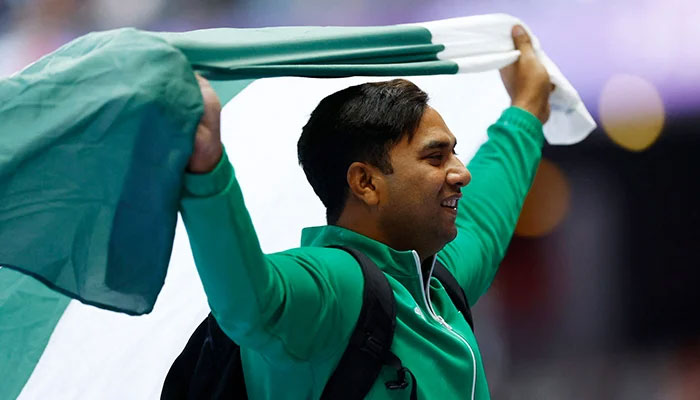Paralympic glory
39-year-old athlete, born with cerebral palsy, has never allowed his condition to define his limits
Last Sunday, France bade farewell to the Paralympic Games 2024 in a spectacular closing ceremony, a celebration of resilience and triumph. For Pakistan, the event held special significance as its sole para-athlete, Haider Ali, brought home a bronze medal in the Men’s Discus Throw F37 event, with a remarkable throw of 52.54 meters on his final attempt. Haider Ali’s journey is one of extraordinary determination and perseverance. The 39-year-old athlete, born with cerebral palsy, has never allowed his condition to define his limits. With his latest bronze medal, Haider now boasts an impressive tally of four Paralympic medals, including one gold, one silver, and two bronze, over five Paralympic appearances since 2008. Yet, amid the celebration of Haider’s success, it is crucial to turn our focus toward the thousands of others in Pakistan with functional limitations, who remain overlooked and under-supported.
According to the Pakistan Bureau of Statistics (PBS), at least seven million people in the country have functional limitations. Many of these individuals have the potential to achieve greatness on the world stage, just as Haider Ali has, but they are stifled by a lack of resources, training opportunities, and societal support. Schools across the country seldom offer therapy or specialized educational services for students with physical disabilities, leaving many capable children confined to their homes. Haider Ali’s remarkable success should serve as a wake-up call for Pakistan’s policymakers, urging them to create a more inclusive environment for individuals with functional limitations. Too often, Pakistan relies on private organizations and the goodwill of NGOs to fill the gaps in support for people with disabilities. This approach leads to a stark inequality, where children from affluent families have access to resources and training, while others are left behind.
Events like the Paralympics offer a glimpse into how other nations are tackling these challenges. Many countries have made significant strides in creating inclusive policies and infrastructure, enabling their citizens to live with dignity and contribute to society regardless of their physical limitations. Pakistan, however, remains trapped in political distractions, failing to prioritize the needs of its most vulnerable citizens. While officials lament the lack of foreign aid and international support, they ignore opportunities to diversify and launch meaningful projects that could truly change lives. Why not partner with countries and international organizations to develop initiatives that focus on the education and training of children with disabilities? The Paralympic Games are more than just a sporting event; they are a platform for individuals who have often felt marginalized or overlooked. They provide an opportunity for people with disabilities to showcase their abilities, proving that they can excel just as much as their able-bodied counterparts. Haider Ali’s success on this global stage is proof that Pakistan, too, has the talent to shine, but it is also a reminder of the work that remains to be done.
-
 Bad Bunny Faces Major Rumour About Personal Life Ahead Of Super Bowl Performance
Bad Bunny Faces Major Rumour About Personal Life Ahead Of Super Bowl Performance -
 Sarah Ferguson’s Links To Jeffrey Epstein Get More Entangled As Expert Talks Of A Testimony Call
Sarah Ferguson’s Links To Jeffrey Epstein Get More Entangled As Expert Talks Of A Testimony Call -
 France Opens Probe Against Former Minister Lang After Epstein File Dump
France Opens Probe Against Former Minister Lang After Epstein File Dump -
 Last Part Of Lil Jon Statement On Son's Death Melts Hearts, Police Suggest Mental Health Issues
Last Part Of Lil Jon Statement On Son's Death Melts Hearts, Police Suggest Mental Health Issues -
 Leonardo DiCaprio's Girlfriend Vittoria Ceretti Given 'greatest Honor Of Her Life'
Leonardo DiCaprio's Girlfriend Vittoria Ceretti Given 'greatest Honor Of Her Life' -
 Beatrice, Eugenie’s Reaction Comes Out After Epstein Files Expose Their Personal Lives Even More
Beatrice, Eugenie’s Reaction Comes Out After Epstein Files Expose Their Personal Lives Even More -
 Will Smith Couldn't Make This Dog Part Of His Family: Here's Why
Will Smith Couldn't Make This Dog Part Of His Family: Here's Why -
 Kylie Jenner In Full Nesting Mode With Timothee Chalamet: ‘Pregnancy No Surprise Now’
Kylie Jenner In Full Nesting Mode With Timothee Chalamet: ‘Pregnancy No Surprise Now’ -
 Laura Dern Reflects On Being Rejected Due To Something She Can't Help
Laura Dern Reflects On Being Rejected Due To Something She Can't Help -
 HBO Axed Naomi Watts's 'Game Of Thrones' Sequel For This Reason
HBO Axed Naomi Watts's 'Game Of Thrones' Sequel For This Reason -
 King Charles' Sandringham Estate Gets 'public Safety Message' After Andrew Move
King Charles' Sandringham Estate Gets 'public Safety Message' After Andrew Move -
 Lewis Capaldi Sends Taylor Swift Sweet Message After 'Opalite' Video Role
Lewis Capaldi Sends Taylor Swift Sweet Message After 'Opalite' Video Role -
 Brooklyn Beckham Plunges Victoria, David Beckham Into Marital Woes: ‘They’re Exhausted As It Seeps Into Marriage
Brooklyn Beckham Plunges Victoria, David Beckham Into Marital Woes: ‘They’re Exhausted As It Seeps Into Marriage -
 Sarah Ferguson Joins Andrew In ‘forcing’ Their Daughters Hand: ‘She Can Lose Everything’
Sarah Ferguson Joins Andrew In ‘forcing’ Their Daughters Hand: ‘She Can Lose Everything’ -
 'Bridgerton' Author Reveals If Actors Will Be Recast In Future Seasons
'Bridgerton' Author Reveals If Actors Will Be Recast In Future Seasons -
 50 Cent Super Bowl Ad Goes Viral
50 Cent Super Bowl Ad Goes Viral




